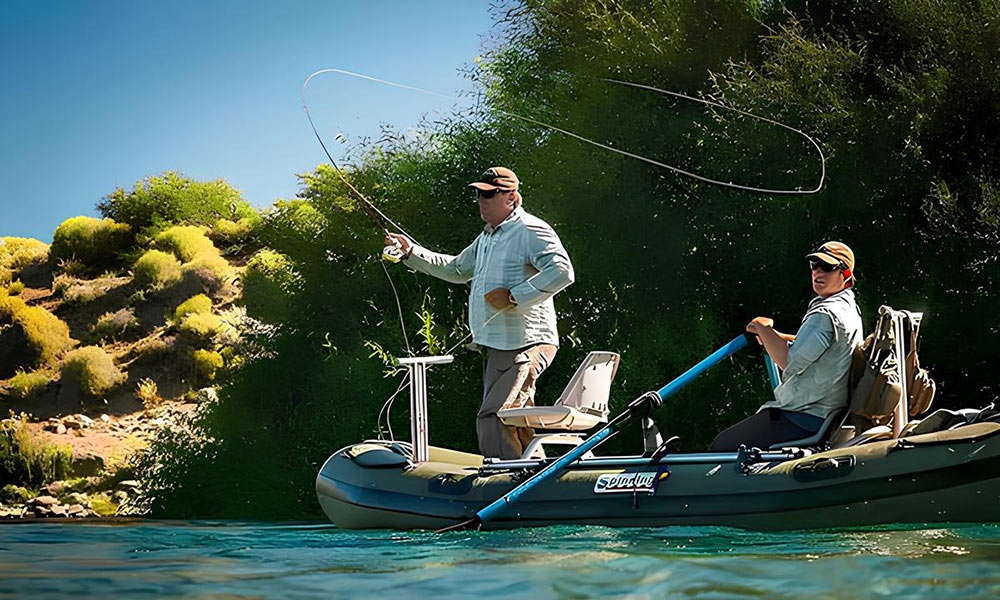Home » Fishng Access » Boat fishing » Raft fishing
Discover top destinations for raft fishing. Plan a lodge-based trip with expert local guides and access to productive waters.

No results available
Raft fishing trips are ideal for remote, shallow, or technical rivers where drift boats and motorboats can’t go. These lodge-based floats give anglers access to untouched water, flexible mobility, and the chance to fish hard-to-reach beats in wild terrain.
Rafts are favored for their portability, shallow draft, and ability to handle rocky rivers and rapids. Whether you’re floating a fly-out river in Alaska or drifting a canyon stream in Patagonia, they provide an efficient and exciting way to fish remote systems.
Rafts are lightweight, highly maneuverable, and easy to launch even in difficult terrain. Their flat-bottomed design allows them to float through shallow water, skim over rocks, and handle technical sections with ease. Most guided setups include a sturdy frame, rowing platform, and comfortable seating to make long floats effective and safe.
They’re also ideal for fly-out or hike-in access, where heavier boats can’t be transported. Guides use them to reach lesser-pressured water, navigate braided river systems, or fish long wilderness stretches where roads don’t exist.
Both rafts and drift boats excel on rivers—but each suits different water types. Rafts are lighter, easier to transport, and handle rougher, shallower, or tighter water better. Drift boats offer more casting stability and space, and are ideal for larger, deeper rivers with consistent flows.
If you’re fishing a technical freestone river or accessing fly-out camps, a raft is often the only reliable option. For bigger Western rivers or smoother flows, drift boats may be preferred.
Rafts are used widely in Alaska to access float-only rivers and tight tributaries. Many lodges include them as part of guided fly-out programs targeting salmon, char, or grayling.
In both Chile and Argentina, rafts make it possible to cover long stretches of trout water in national parks and roadless valleys—ideal for multi-day floats or accessing private beats.
Mongolia’s wild rivers often require portable rafts to reach taimen water. Many top lodges use raft-based expeditions to link rivers and access long wilderness stretches without pressure.
Montana, Colorado, and Idaho all have river systems best explored by raft—especially freestone stretches where drift boats can’t go or overnight gear is needed.
FishingExplora helps you connect with expert lodges that specialize in raft-based access—whether it’s a fly-out lodge in Alaska or a wilderness float in Patagonia. These trips blend adventure with top-tier guiding and give you access to rivers many never see.
Rafts are inflatable and more portable—ideal for shallow, remote, or technical rivers. Drift boats are hard-sided and offer better stability on larger, smoother rivers. Each has strengths depending on the water type.
Yes. Most fishing rafts are built to handle Class II–IV rapids and are guided by experienced oarsmen. Self-bailing rafts are especially good in splashy or rocky sections.
Absolutely. Rafts offer stealth, flexibility, and access to untouched runs—perfect for presenting dry flies, streamers, or nymphs in dynamic river environments.
It depends on the river. Rafts are better for remote access, shallow or technical water, and fly-out trips. Drift boats offer more stability and comfort on larger, calmer rivers. Many lodges use both, choosing based on river flow, access, and angler preference.
Ready to plan your raft fishing trip? Explore FishingExplora’s trusted lodge partners or browse by region to find your next float trip.